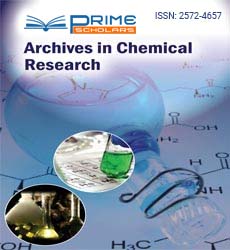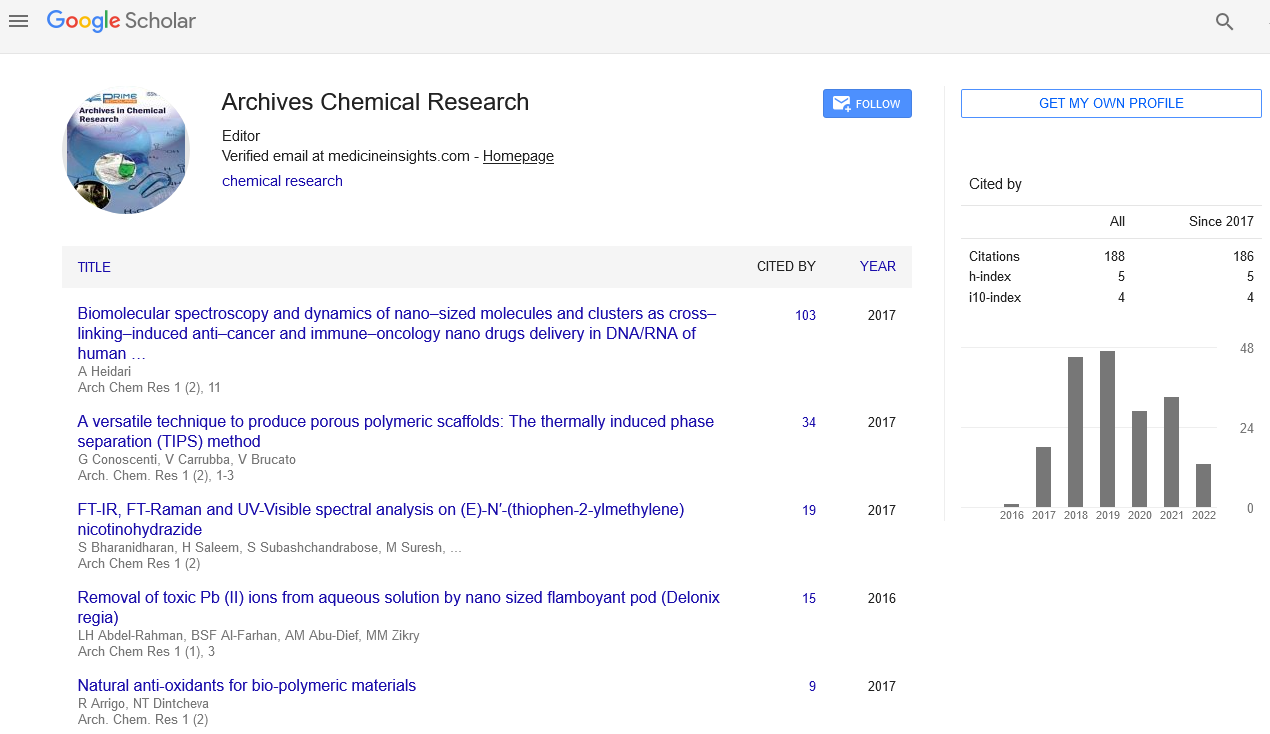Commentary Article - (2023) Volume 7, Issue 3
The Chemistry of Medicine: How Drugs Are Developed and Tested
Anne Gabriel*
Department of Chemistry, Sorbonne University, France
*Correspondence:
Anne Gabriel,
Department of Chemistry, Sorbonne University,
France,
Email:
Received: 30-Aug-2023, Manuscript No. IPACRH-23-18196;
Editor assigned: 01-Sep-2023, Pre QC No. IPACRH-23-18196 (PQ);
Reviewed: 15-Sep-2023, QC No. IPACRH-23-18196;
Revised: 20-Sep-2023, Manuscript No. IPACRH-23-18196 (R);
Published:
27-Sep-2023, DOI: 10.21767/2572-4657.7.3.28
Description
Medicine is a testament to the incredible power of chemistry.
The development of life-saving drugs is a complex and multifaceted
process that relies heavily on the principles of chemistry.
This article explores how drugs are created and tested, shedding
light on the indispensable role of chemistry in the field of
medicine. The journey of a drug from concept to the pharmacy
shelf is a lengthy and intricate one, involving multiple stages
that heavily rely on chemistry: Drug development often begins
with identifying a specific biological target, such as a protein,
gene, or cell receptor, associated with a disease. This stage involves
a deep understanding of biochemistry and genetics to
pinpoint potential targets for intervention. Medicinal chemistry
plays a crucial role in this phase. Chemists design and synthesize
molecules that have the potential to interact with the
identified target. These molecules are called drug candidates.
The synthesized compounds undergo extensive preclinical testing.
This stage includes pharmacology studies to assess how
the compounds interact with the target and toxicology studies
to evaluate safety. The chemistry of these compounds is closely
examined to ensure their stability and effectiveness. Successful
drug candidates advance to clinical trials, where they are tested
on human subjects. These trials are meticulously designed to
evaluate the safety, efficacy, and pharmacokinetics of the drug
candidate. Analytical chemistry is instrumental in monitoring
drug concentrations in the body, ensuring that the drug is effective
and safe at the prescribed doses. If the drug candidate
passes clinical trials and is deemed safe and effective, regulatory
authorities review the extensive data generated during the
development process. This is where analytical chemistry and
data analysis play a critical role in ensuring that the drug meets
the stringent criteria for approval. Chemistry also plays a vital
role in drug formulation. Once a drug is developed, it needs to
be converted into a suitable form for administration, whether
it’s a tablet, capsule, liquid, or injectable. Formulation chemists
work to optimize the physical and chemical properties of the
drug to ensure stability, bioavailability, and patient compliance.
Ensuring the quality and consistency of drugs is paramount.
Analytical chemistry techniques, such as chromatography and
mass spectrometry, are used to validate the identity, purity,
and strength of drugs. These methods are employed in quality
control laboratories to confirm that each batch of a drug meets
the required specifications. Computational chemistry has become
increasingly important in drug discovery. Virtual screening,
molecular modeling, and simulation allow researchers to
predict the interactions between drug candidates and their
targets, significantly speeding up the drug development process.
Chemistry continues to drive innovation in medicine. Advances
in fields like nanomedicine and gene therapy rely on a
deep understanding of chemical principles. Moreover, the field
of personalized medicine tailors drug treatments to individual
genetic profiles, demonstrating how chemistry is integral to optimizing
therapeutic outcomes.
In conclusion, the chemistry of medicine is a dynamic and
evolving field. The development and testing of drugs demand
a sophisticated interplay of chemical knowledge, technology,
and analytical techniques. It’s a testament to the crucial role
chemistry plays in our ability to combat diseases and improve
the quality of life for countless individuals.
Acknowledgement
None.
Conflict Of Interest
Authors declare no conflict of interest.
Citation: Gabriel A (2023) The Chemistry of Medicine: How Drugs are Developed and Tested. Arch Chem Res. 7:28
Copyright: © 2023 Gabriel A. This is an open-access article distributed under the terms of the Creative Commons Attribution License, which permits unrestricted use, distribution, and reproduction in any medium, provided the original author and source are credited.

